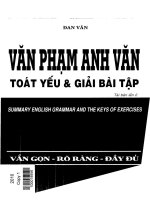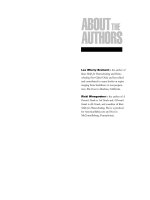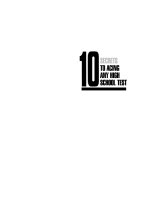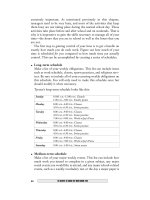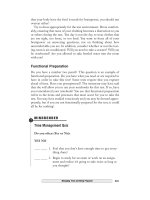VĂN PHẠM ANH VĂN
Bạn đang xem bản rút gọn của tài liệu. Xem và tải ngay bản đầy đủ của tài liệu tại đây (798.56 KB, 109 trang )
VĂN PHẠM ANH VĂN
Văn phạm Anh văn
Trang 1
VĂN PHẠM ANH VĂN
Các thì trong tiếng Anh
Kevin Khoâi Tröông vaø Nam Phöông
1- HIỆN TẠI ðƠN/HIỆN TẠI ðƠN TIẾP DIỄN
1- THÌ HIỆN TẠI ÐƠN
Thì hiện tại ñơn giản diễn tả hành ñộng có
thật trong quá khứ, hiện tại, và tương lai.
Thì hiện tại ñơn giản cũng diễn tả thói quen
và hoạt ñộng hàng ngày.
CHỦ TỪ + ÐỘNG TỪ (ñộng từ ở thì hiện
tại, ñộng từ thêm "S" hay "ES" nếu chủ từ
là ngôi 3 số ít: She, he, it, Mary, John)
Thì hiện tại ñơn giản có thể diễn tả thời
gian trong tương lai khi ý nghĩ ñó thuộc về
thời khóa biểu.
The English alphabet consists of 26 letters.
The sun rises in the east.
She goes to school every day.
The boy always wakes up at 8 every
morning.
SAI:
They are always trying to help him.
We are studying every day.
ÐÚNG:
They always try to help him.
We study every day.
The game starts in ten minutes.
My class finishes next month.
Cụm từ và từ ngữ chỉ thời gian: Always, usually, often, sometimes etc., (a fact, habit, or
repeated action), every time, as a rule, every day (every other day), once (a month),
once in a while
Văn phạm Anh văn
Trang 2
THÌ HIỆN TẠI TIẾP DIỄN
Thì hiện tại tiếp diễn diễn tả hành ñộng
ñang xảy ra.
CHỦ TỪ + IS/ARE/AM + ÐỘNG TỪ
THÊM -ING
Một hành ñộng gì ñó ñang xảy ra tuần này,
tháng này, hoặc năm này.
Thì hiện tại tiếp diễn có thể diễn tả thời
gian trong tương lai khi ý nghĩ ñó là 1 sự
ñịnh sẵn.
I'm typing right now.
It is raining at the moment.
Shhh! The baby is sleeping.
She is taking ESL 107 this semester.
Tammy is writing a letter to her mom
tomorrow.
Jack is visiting his relatives tomorrow.
SAI: It is raining tomorrow. (Rain không
thể là 1 sự dự ñịnh trước
Cụm và từ ngữ chỉ thời gian: Right now, at the moment, at present, now, shhh!, listen!,
look!, this semester.
Kevin Khôi Trương
SIMPLE PRESENT
Tóm tắt:
Present simple ñể chỉ:
1) Sự việc xảy ra trong hiện tại
2) Những sự thật hiển nhiên, sự việc lập ñi lập lại hằng ngày: Thí dụ: Trái ñất quay
xung quanh mặt trời.
Hằng ngày tôi thức dậy lúc 7 giờ sáng
3) Những ñộng từ không ảnh hưởng ñến thời gian: ñộng từ tĩnh (static verbs)
To belong to, to cost, to know, to believe, to like,
to love, to mean, to see, to understand ...
I (dis)like / love / hate / want that girl
Văn phạm Anh văn
Trang 3
I believe / suppose / think you’re right
I hear / see / feel the world around us
It tastes / smells good
4) Sau những liên từ WHEN, AS SOON AS
5) THỂ NGHI VẤN:
Thêm ñằng trước DO hay DOES (ngôi thứ 3 số ít)
6) THỂ PHỦ ÐỊNH:
thêm DON'T , DOESN'T
__________________
The simple present is used to express actions which take place in the present or which
occur regularly (Things that happen repetedly) .
It also serves to express general or absolute statements not anchored in a particular time
frame (Things in general)
I work at home.
The earth revolves around the sun
Politics are a dirty business.
Jill speaks four languages fluently.
I get up at seven o’clock every morning
Mrs. Smith teaches English at my school
On Sundays, we like to fish.
INTERROGATIVE FORM
In the interrogative, the present is generally introduced by a form of the verb "to do"
("do / does"):
Does your father like to cook?
Do you have time to stop by my place?
NEGATIVE FORM
The appropriate form of the verb "to do" will also be used for the negative:
I do not (don't) work at home.
No, he does not (doesn't) like to cook.
AFTER WHEN AS SOON AS ...
Văn phạm Anh văn
Trang 4
After the conjunctions "when," "as soon as," etc., the present is used, even though
actions expressed may refer to the future:
She'll come when she can.
He'll pay us as soon as we finish.
Forming the simple present
The present is extremely regular in its conjugation. As a general rule, one uses the
base form of the infinitive (minus the preposition "to").
For the third person singular ("he," "she," "it"), an "-s" is added if the verb ends
in a consonant,
or "-es" if the verb ends with a vowel:
To work
I work
you work
he / she / it works
we work
they work
To go
I go
you go
he / she / it goes
we go
they go
However:
verbs ending with "consonant + y" (for example, "to try," "to cry," "to bury,"
etc.) will end in "-ies" in the third person singular:
To bury
I bury
you bury
he / she buries
we bury
they bury
Văn phạm Anh văn
Trang 5
"To have", "to be"
The only irregular verbs in the present are "to have," "to be," and the modal
verbs.
To have
I have
you have
he / she has
we have
they have
To be
I am
you are
he / she is
we are
they are
PRESENT CONTINUOUS
TÓM TẮT
1) Ðể nói sự vật xảy ra trong lúc ta ñang nói chuyện
2) Nói một việc mà ta ñã chuẩn bị ñể làm.
Một tương lai chắc chắn ñã soạn sẵn
3) Những ñộng từ tĩnh trong ý nghĩa hiện tại
____________________________
1* To say that st is happening at or around the time of speaking
2* you are talking about what you have already arranged to do
3* Les verbes statistiques dans le sens du présent simple
***
1)
Don’t interrupt while I’m talking to somebody else
Văn phạm Anh văn
Trang 6
Please be quiet, I’m watching a good programme
He’s trying to get the car to start /Not now, I’m thinking
2)
I can’t meet you tomorrow because my parents are coming to see me
What are you doing tomorrow evening ?
- I’m going to the theatre
This is Tom’s diary for next week:
he’s playing tennis on Monday, he’s going to the dentist on Tuesday, he’ having dinner
on Friday...
3)
What are you thinking about ?
We’re not seeing a lot of him these days
Are you not feeling well today ?
We’re tasting the wine to see if it’s alright
Nam Phương
2- HIỆN TẠI HOÀN THÀNH/HIỆN TẠI HOÀN THÀNH TIẾP DIỄN
THÌ HIỆN TẠI HOÀN THÀNH
CHỦ TỪ + HAVE/ HAS + QUÁ KHỨ
PHÂN TỪ (PAST PARTICIPLE)
Thì hiện tại hoàn thành diễn tả hành ñộng
ñã xảy ra hoặc chưa bao giờ xảy ra ở 1 thời
She has never seen snow.
I have gone to Disneyland several times.
We have been here since 1995.
Văn phạm Anh văn
Trang 7
gian không xác ñịnh trong quá khứ.
Thì hiện tại hoàn thành cũng diễn tả sự lập
ñi lập lại của 1 hành ñộng trong quá khứ.
Thì hiện tại hoàn thành cũng ñược dùng
với i since và for.
Since + thời gian bắt ñầu (1995, I was
young, this morning etc.) Khi người nói
dùng since, người nghe phải tính thời gian
là bao lâu.
For + khoảng thời gian (từ lúc ñầu tới bây
giờ) Khi người nói dùng for, người nói
phải tính thời gian là bao lâu.
They have known me for five years.
Cụm và từ ngữ chỉ thời gian: Never, ever, in the last fifty years, this semester, since,
for, so far, up to now, up until now, up to the present, yet, recently, lately, in recent
years, many times, once, twice, and in his/her whole life
THÌ HIỆN TẠI HOÀN THÀNH TIẾP DIỄN
Thì hiện tại hoàn thành tiếp diễn nhấn
mạnh khoảng thời gian của 1 hành ñộng ñã
xảy ra trong quá khứ và tiếp tục tới hiện tại
(có thể tới tương lai).
CHỦ TỪ + HAVE/HAS + BEEN + ÐỘNG
TỪ THÊM -ING
I have been waiting for you about 20
minutes.
The child has been sleeping all afternoon.
Cụm và từ ngữ chỉ thời gian: All day, all week, since, for, for a long time, almost every
day this week, recently, lately, in the past week, in recent years, up until now, and so far
Kevin Khôi Trương
PRESENT PERFECT CONTINUOUS
I have been doing
You have been doing
He has been doing
Văn phạm Anh văn
Trang 8
We have been doing
You have been doing
They have been doing
TÓM TẮT:
Ðể nói một hành ñộng kéo dài trong quá khứ và VỪA MỚI ngừng.
Ðể hỏi việc xảy ra bao nhiêu lâu trong quá khứ và ta hứng thú câu chuyện: hành ñộng
chưa chấm dứt.
**************************
This tense is formed with the modal "HAVE" or "HAS" (for third-person singular
subjects) plus "BEEN," plus the present participle of the verb (with an -ing ending):
1* To talk about a long action which began in the past and has just stopped.
2* To ask or say how long st has been happened. The action began in the past & is still
happening or has just stopped
how long ; for ( for 5 years ; for over an hour ); since ; today ; recently ;
3* For actions repeated over a period of time ( how long ; for ; since )
*** To say how long st has been happening .
*** We are interested in the action : the action has not been finished .
1* I have been working in the garden all morning.
George has been painting that house for as long as I can remember.
You're out of breath . Have you been running ?
She has been running and her heart is still beating fast.
Why are your clothes so dirty? What have you been doing ?
That man over there is bright red. I think he's been sunbathing.
Janet is hot and tired . She has been playing tennis.
Ann is very tired . She has been working hard
It has just been raining.
2* It is raining now. It began to rain 2 hours ago and it is still raining . It has been
raining for 2 hours
Have you been working hard today ?
How long have you been learning English ?
I've been waiting here for over an hour
Văn phạm Anh văn
Trang 9
I've been watching TV since two 2 o'clock .
George hasn't been feeling well recently.
3* She has been playing tennis since she was eight
How long have you been smoking ?
It's raining : How long has it been raining ?
My foot is hurting : How long has your foot been hurting ?
Kevin is studying He has been studying for 3 hours
Mary is working in London . She started working there on 20 May . She has been
working since 20 May.
Nam Phương
3- QUÁ KHỨ/QUÁ KHỨ TIẾP DIỄN
THÌ QUÁ KHỨ ÐƠN
Thì quá khứ ñơn diễn tả hành ñộng ñã xảy
ra và kết thúc trong quá khứ với thời gian
xác ñịnh.
CHỦ TỪ + ÐỘNG TỪ QUÁ KHỨ
When + thì quá khứ ñơn (simple past)
When + hành ñộng thứ nhất
I went to the library last night.
She came to the U.S. five years ago.
He met me in 1999.
When they saw the accident, they called
the police.
Cụm và từ ngữ chỉ thời gian: last night, last year, last time, etc., ago, in 1999, today,
yesterday, then = at that time, in the 1800's, in the 19th century, when, and for
Today ñôi khi ñược dùng ở thì hiện tại tiếp diễn và tương lai ñơn. For ñôi khi ñược
dùng ở thì hiện tại hoàn thành (present perfect).
THÌ QUÁ KHỨ TIẾP DIỄN
In (a), 2 hành ñộng ñã xảy ra cùng lúc.
Nhưng hành ñộng thứ nhất ñã xảy ra sớm
hơn và ñã ñang tiếp tục xảy ra thì hành
ñộng thứ hai xảy ra.
CHỦ TỪ + WERE/WAS + ÐỘNG TÙ
THÊM -ING
a. What were you doing when I called you
last night?
b. He was watching TV while his wife was
cleaning the bedroom.
Văn phạm Anh văn
Trang 10
While + thì quá khứ tiếp diễn (past
progressive)
In (b), 2 hành ñộng ñã xảy ra cùng một
lúc.
Cụm và từ ngữ chỉ thời gian: While, at that very moment, at 10:00 last night, and this
morning (afternoon)
Kevin Khôi Trương
SIMPLE PAST CONTINUOUS
I was doing
You were doing
He was doing
We were doing
You were doing
They were doing
TÓM TẮT:
Hành ñộng kéo dài, tiếp tục, ở một thời ñiểm nào ñó trong quá khứ
Ðể nói hành ñộng kéo dài, ñang ở giữa công việc, trong một thời gian nào ñó. Không
cho biết khi nào chấm dứt.
*********************************
1* The PAST PROGRESSIVE TENSE indicates continuing action, something that was
happening, going on, at some point in the past. This tense is formed with the helping "to
be" verb, in the past tense, plus the present participle of the verb (with an -ing ending):
2* To say that someone was in the middle of doing something at a certain time.
3* To say that st happend in the middle of st.
Văn phạm Anh văn
Trang 11
4* It doesn't tell us wether an action was finished or not.
5* To tell how long something has been happening
Examples:
1* I was riding my bike all day yesterday.
Joel was being a terrible role model for his younger brother.
Dad was working in his garden all morning.
During the mid-50s, real estate speculators were buying all the swampland in Central
Florida, and innocent people were investing all their money in bogus development
projects.
Was he being good to you?
2* This time last year I was living in Spain. What were you doing at 10 o'clock last
night ?
3* Tom burnt his hand when he was cooking the lunch
While I was working in the garden , I hurt my back.
I saw Jim in the park. He was sitting on the grass.
It was raining when I got up .
Carlos lost his watch while he was running.I was sleeping on the couch when Bertie
smashed through the door.
5* Tom was cooking the dinner . (He was in the middle of cooking, we don't know
wether he finished or not).
COMPARE:
When Tom arrived,
- we were having dinner. (We had already started dinner before Tom arrived )
- we had dinner ( Tom arrived and we had dinner )
You've been smoking too much recently. You should smoke less.
Ann has been writing letters all day.
Văn phạm Anh văn
Trang 12
Nam Phương
4- QUÁ KHỨ HOÀN THÀNH/QUÁ KHỨ HOÀN THÀNH TIẾP DIỄN
THÌ QUÁ KHỨ HOÀN THÀNH
Thì quá khứ hoàn thành diễn tả 1 hành
ñộng ñã xảy ra và kết thúc trong quá khứ
trước 1 hành ñộng khác cũng xảy ra và kết
thúc trong quá khứ.
CHỦ TỪ + HAD + QUÁ KHỨ PHÂN TỪ
I had just finished watering the lawn when
it began to rain.
She had studied English before she came to
the U.S.
After he had eaten breakfast, he went to
school.
THÌ QUÁ KHỨ HOÀN THÀNH TIẾP DIỄN
Thì quá khứ hoàn thành tiếp diễn nhấn
mạnh khoảng thời gian của 1 hành ñộng ñã
ñang xảy ra trong quá khứ và kết thúc trước
1 hành ñộng khác xảy ra và cũng kết thúc
trong quá khứ.
CHỦ TỪ + HAD + BEEN + ÐỘNG TỪ
THÊM -ING
We had been living in Santa Ana for 2
years before we moved to Garden Grove.
Văn phạm Anh văn
Trang 13
Cụm và từ ngữ chỉ thời gian: Until then, by the time, prior to that time, before, after
Dùng thì quá khứ hoàn thành cho hành ñộng thứ nhất. Dùng thì quá khứ cho hành ñộng
thứ hai.
Mẹo: Quí vị có thể nhớ theo cách này.
Chữ cái tiếng Anh A B C.......
"A" ñứng vị trí thứ nhất và "A" là chữ cái ñầu tiên của chữ "After". Cho nên After +
hành ñộng thứ nhất.
Trước tiên: Alex had gone to bed.
Sau ñó': He couldn't sleep.
After Alex had gone to bed, he couldn't sleep.
Trước tiên: Jessica had cooked dinner.
Sau ñó': Her boyfriend came.
Jessica's boyfriend came after she had cooked dinner.
"B" ñứng ở vị trí thứ hai, và "B" là chữ cái ñầu tiên của chữ "Before". Cho nên Before
+ hành ñộng thứ 2.
Trước tiên: Kimberly had taken the test.
Sau ñó': She went home yesterday.
Kimberly had taken the test before she went home yesterday.
Trước tiên: Brandon had brushed his teeth.
Sau ñó': He went to bed.
Before Brandon went to bed, he had brushed his teeth.
Kevin Khôi Trương
PAST PERFECT CONTINUOUS
Văn phạm Anh văn
Trang 14
TÓM TẮT:
Ðể diễn tả một hành ñộng kéo dài, ÐÃ CHẤM DỨT ở một thời diểm trong quá khứ.
Không có Past perfect progressive cho "To be". "Had been Being" ñược diễn tả bằng
"Had been" .
***
THE PAST PERFECT CONTINUOUS TENSE indicates a continuous action that was
completed at some point in the past.
This tense is formed with the modal "HAD" plus "BEEN," plus the present participle of
the verb (with an -ing ending):
"I had been working in the garden all morning. George had been painting his house for
weeks, but he finally gave up."
I hadn't been going
You hadn't been going
He hadn't been going
We hadn't been going
You hadn't been going
They hadn't been going
To say how long st had been happening before something else happened
It had been raining (the sun was shining and the ground was wet it had stopped raining.
)
I was very tired when I arrived home , I had been working hard all day
He was out of breath . He had been running
The house was quiet when I got home. Everybody had gone to bed.
Tom wasn't there when I arrived : he had just gone out
The man was a complete st ranger to me . I had never seen before.
Văn phạm Anh văn
Trang 15
Bill no longer had his car: he had sold it
NOTE:
There is no past perfect progressive for the "to be" verb. "Had been being" is expressed
simply as "had been":
"We had been successful before, but we somehow lost our knack."
Nam Phương
5- TƯƠNG LAI/TƯƠNG LAI TIẾP DIỄN
THÌ TƯƠNG LAI ÐƠN
Khi quí vị ñoán (predict, guess), dùng will
hoặc be going to.
Khi quí vị chỉ dự ñịnh trước, dùng be
going to không ñược dùng will.
CHỦ TỪ + AM (IS/ARE) GOING TO +
ÐỘNG TỪ (ở hiện tại: simple form)
Khi quí vị diễn tả sự tình nguyện hoặc sự
sẵn sàng, dùng will không ñược dùng be
going to.
CHỦ TỪ + WILL + ÐỘNG TỪ (ở hiện tại:
simple form)
ÐOÁN: Dùng cả WILL lẫn BE GOING
TO
According to the reporter, it will be sunny
tomorrow. HOẶC
According to the reporter, it is going to be
sunny tomorrow.
I'm going to study tomorrow. (không ñược
dùng WILL)
I will help you do your homework. (không
ñược dùng BE GOING TO)
THÌ TƯƠNG LAI TIẾP DIỄN
Thì tương lai tiếp diễn diễn tả hành ñộng sẽ
xảy ra ở 1 thời ñiểm nào ñó trong tương lai.
CHỦ TỪ + WILL + BE + ÐỘNG TỪ
THÊM -ING hoặc
I will be watching the "Wheel of Fortune"
show when you call tonight.
Don't come to my house at five. I am
going to be eating.
Văn phạm Anh văn
Trang 16
CHỦ TỪ + BE GOING TO + BE + ÐỘNG
TỪ THÊM -ING
Cụm và từ ngữ chỉ thời gian: In the future, next year, next week, next time, and soon
Kevin Khôi Trương
6- TƯƠNG LAI HOÀN THÀNH/TƯƠNG LAI HOÀN THÀNH TIẾP DIỄN
THÌ TƯƠNG LAI HOÀN THÀNH
Thì tương lai hoàn thành diễn tả 1 hành
ñộng trong tương lai sẽ kết thúc trước 1
hành ñộng khác trong tương lai.
CHỦ TỪ + WILL + HAVE + QUÁ KHỨ
PHÂN TỪ (PAST PARTICIPLE)
Cụm và từ ngữ chỉ thời gian: By the time
and prior to the time (có nghĩa là before)
I'm going to go to school at eight. My
friend is going to come to my house at nine
tomorrow. By the time my friend comes to
my house, I will have gone to school.
She will have put on some make-up prior
to the time her boyfriend comes tonight.
THÌ TƯƠNG LAI HOÀN THÀNH TIẾP DIỄN
Thì tương lai hoàn thành tiếp diễn nhấn
mạnh khoảng thời gian của 1 hành ñộng sẽ
ñang xảy ra trong tương lai và sẽ kết thúc
trước 1 hành ñộng khác trong tương lai.
CHỦ TỪ + WILL + HAVE + BEEN +
ÐỘNG TỪ THÊM -ING
He will have been studying for four hours
by the time he takes his examination
tonight.
Kevin Khôi Trương
Văn phạm Anh văn
Trang 17
Mạo từ - Articles
Nam Phương
Tóm tắt:
Indefinite articles: a, an
** Có 2 dạng "A" và "AN"** AN khi ñứng trước môt nguyên âm : vowel
a cat
an accident
some dogs
Ngoại trừ trước U nhưng phải ñọc là "ju" (phát âm như chữ "yêu" tiếng Việt.
Thí dụ
a University
a unit
not a one
a unicorn
Definite articles: The
Giống như adjectives (possessive, demonstratives, numeral, ...) mạo từ " THE "dùng ñể
bổ nghĩa cho danh từ.
Nó ñứng trước danh từ. (Tiếng Việt: cái , con, trái... như cái hoa, con nai, trái cam...)
** Dùng ñể chỉ người, vật, nơi chốn... mà ta ñã xác ñịnh rồi. Thí dụ như "con gái hông
hàng xóm", ta biết là ai rồi, nên ta dùng definite article "the". Nếu như một người nào
ñó, thì dùng indefinite article "a".
** Dưới dạng ghi vấn và phủ ñịnh, mạo từ không thay ñổi.
** Trước một nguyên âm, "the" ñược ñọc là "ñi"
** Không dùng mạo từ khi:
*Danh từ trừu tượng,
Văn phạm Anh văn
Trang 18
* Số nhiều của "a"
* Ngày, tháng, năm
* Chức vị
o0o
KHI DÙNG CHỨC TƯỚC NGHỀ NGHIỆP
He interviewed the president yesterday
We saw the Queen on TV
The Doctor left an hour ago
Exception:
« The Emperor » et « The Tsar »
DANH TỪ RIÊNG Số nhiều (proper names, noms propres)
The Wilsons, the Bakers
DANH TỪ ÐỊA DƯ Số nhiều :
The West Indies, the USA, the British Isles
Exception: The United Kingdom
HỒ (of) Lacs
The lake of Geneva
TÊN BIỂN, ÐẠI DƯƠNG, GIÒNG NƯỚC
The Thames, the Mississippi, The Pacific
The Mediterranean [‘rein]
TÊN DÃY NÚI
The Alpes, the Rocky Mountains
Văn phạm Anh văn
Trang 19
TÊN ÐƯỜNG VÀ CÔNG TRÌNH KỶ NIỆM (Có chữ "of" ñằng trước)
The House of Parliament
Khi nào không dùng mạo từ?
Khi chức tước, nghề nghiệp ñược tiếp theo bằng TÊN của người ñó
( Titre, grade, profession.. ils sont suivis du nom de la personne )
He interviewed Pr. Kennedy
We saw Queen Elizabeth on TV
Doctor Qeen left an hour ago
President Mitterrand completed two terms.
We saw Professor Miller at the restaurant.
She met with Doctor Schmidt.
DANH TỪ RIÊNG SỐ ÍT
Christ
DANH TỪ ÐỊA LÝ SỐ ÍT
France, England
Wales (số ít)
HÔ, ÐỈNH NÚI, ÐƯỜNG VÀ CÔNG TRÌNH KỶ NIỆM
(Lacs, Sommets, Rues et monuments)
Lake Ontario
Mount Everest, Ben Nevis
Fith Avenue, Oxford Street Wesminter Abbey
NAM PHƯƠNG
Văn phạm Anh văn
Trang 20
Khi quí vị nói về những danh từ chung (nouns in general), ñặt "a," "an," hoặc "kho^ng
ma.o tu?`" trước những danh từ ñó. "a" ñược dùng trước phụ âm (b, c, d, f.....). "an"
ñược dùng trước nguyên âm (a, e, i, o, and u). "kho^ng ma.o tu?`" ñược dùng trước
danh từ số nhiều và danh từ không ñếm ñược. Quí vị chỉ nên nhớ 5 nguyên âm. Ngoài ra
là phu âm chứ không nên nhớ vừa nguyên âm vừa phụ âm.
Danh từ số ít He met a girl.
Danh từ số ít I threw an apple away.
Danh từ số nhiều
Books are made from paper. (không có
mạo từ ở trước chữ "books")
Danh từ không ñếm ñược
Milk is good for everyone. (không có mạo
từ ở trước chữ "milk")
NGOẠI LỆ:
a uniform, a university, a union (u ñược phát âm là "diu" và ñược coi là 1 nguyên
âm "d".)
an honest girl, an honorable man (h câm)
Khi quí vị nói về những danh từ bất ñịnh (indefinite nouns), ñặt "a" hoặc "some" trước
những danh từ ñó. "some" ñược dùng với danh từ bất ñịnh số nhiều và danh từ bất ñịnh
không ñếm ñược.
Danh từ số ít Lan bought a shirt.
Danh từ số nhiều Nancy wants to order some chairs.
Danh từ không ñếm ñược Andy got some mail today.
Khi quí vị nói về những danh từ xác ñịnh (definite nouns), ñặt "the" trước những danh
từ ñó. Khi cả người nói lẫn người nghe ñều biết về 1 danh từ rõ ràng, ñặt "the." trước
danh từ ñó. "the" ñược dùng với danh từ số ít, số nhiều và danh từ không ñếm ñược.
Danh từ số ít Where is the car, Joseph?
Danh từ số nhiều She already talked to the children.
Danh từ không ñếm ñược Thank you for the advice, Amy.
Khi quí vị biết danh từ chỉ có duy nhất 1, dùng "the".
Chỉ có 1 mặt trời The sun was bright yesterday.
Khi quí vị nhắc ñến 1 danh từ nào ñó từ lần thứ 2 trở ñi, dùng "the".
Nhà ñược nhắc ñến lần thứ 2.
We have just bought a house. The house is
beautiful. The house is big.
Khi quí vị nói về 1 hiệp hội hay liên ñoàn, dùng "the".
Nước Mỹ có 50 tiểu bang. Phi Luật Tân
dược bao quanh bởi hơn 7000 hòn ñảo.
The United States, the Philippines, the
United Nations...
Văn phạm Anh văn
Trang 21
Shall
Nam Phương
Ngôi thứ nhất số ít và số nhiều (I SHALL va WE SHALL): Thì Tương lai:
1) Câu hỏi:
Ðể hỏi ý kiến hay lời khuyên bảo
Shall I help you ?
2) Câu trả lời:
Bởi vì tôi không thể làm khác hơn ñược... hay tôi sẽ làm nếu việc ñó không làm phiền tôi
...
Yes, I shall
3) Dùng I SHALL, WE SHALL khi:
a) Bị bó buộc, không có sự chọn lựa hay ý muốn..
b) Không ñược tự do
c) Hành ñộng không thể lay chuyển ñược
d) Những hoạt ñộng không cố ý:
to know, understand, remember, forget
Now, Ernest, I will give you one more chance, and if you don’t say « come », I shall know
that you are self-willed and naughty
I shall always remember your calling me a liar
e) Cho những cảm giác và tình cảm:
to be cold, glad, disappointed, to like, to enjoy, to hate...
Văn phạm Anh văn
Trang 22
We shall be glad to meet your friend
We shall meet you when you have gone
We shall all be very tired
Thí dụ:
Shall I tell him about it ?
- What shall I do ? (Tôi sẽ làm gì ñây?)
- What shall we have for lunch ? (Ta sẽ ăn gì trưa nay?, hỏi ý kiến )
- How long shall we wait ?
- I shall not (shan’t) do it by myself. (I can't...)
- I shall be very grateful if you do
- I shall (not will) call you tomorrow. (tương lai)
- We shall (not will) be sure to keep in touch (tình cảm)
Shall - Will
Võ Thị Diệu Hằng
A - Shall
I) Ngôi thứ nhất (I, We)
1) Thì tương lai
Khi dùng ngôi thứ nhất (I và We), chia với trợ ñộng từ (auxiliary verb) SHALL +
ñộng từ chính nguyên mẫu , nếu kèm theo những trạng từ (adverb) chỉ thời gian
tương lai (tomorrow, next year, tonight...) thì shall dùng ñể nói về thì Tương lai
I shall be late home tonight. (Tôi sẽ về nhà trễ tối nay)
If you do that one more time, I shall be very cross. (Nếu... sẽ..)
I shall never forget you.
I shall have to call you back - there's someone at the front door.
Next month I shall have worked here for five years.(1)
Shall we be able to get this finished today, do you think?
I'm afraid I shall not/shan't be able to come to your party.
I shall hope to hear from you again soon.(Formal = hình thức)
I shall look forward to meeting you next week.(Formal)
So we'll see you at the weekend, shall we (= is that right)? (2)
We shall (= intend to = có ý ñịnh, có mục ñích) let you know as soon as there's any
Văn phạm Anh văn
Trang 23
news.
This is an important point in my argument, and I shall (= intend to) come back to it.
***
(1) Future perfect = Hành ñộng trong tương lai, biết trước sẽ ñược hoàn tất trong
năm năm tới, một hành ñộng trong tương lai nhưng xảy ra trước (thời gian năm
năm)
Thí dụ:
• She will have finished before eight o'clock. (Hành ñộng "to finish" xong
TRƯỚC "eight o'clock")
• Tomorrow morning they will all have left. (Hành ñộng "to leave" xong trước
"Tomorrow morning")
• They will already have finished eating by the time we get there.
(2) "We shall...": Vì có nhiều ý kiến khác nhau. Ý chúng tôi cũng có thể sẽ tới cũng
có thể không ... ý của các bạn có thích chúng tôi tới không?
Nếu dùng "We will..." thì ta chỉ có một con ñường duy nhất là "chúng tôi sẽ ñến gặp
các bạn cuối tuần này này"
2) Yêu cầu (Suggestion)
a) Câu hỏi:
Dưới dạng câu hỏi: Tùy nội dung trong câu (vị ngữ) mà ta hiểu ñó là sự yêu cầu
(suggestion ), sự phán xét (judg(e)ment), ñể hỏi ý kiến hay lời khuyên bảo, ñể nói
lên sự yêu cầu làm một việc gì ñó.
Shall I help you ?
I'm cold. Shall I close this window? (Tôi lạnh. Tôi có thể ñóng cửa ñược không?)
Shall we go out for dinner tonight? (Mình ñi ăn tối nhen?)
Shall I (= Do you want me to) pick the children up from school today?
What shall (=What do you suggest that) we do about this broken window?
Which restaurant shall we (=would you like us to) go to?
b) Câu trả lời:
Bởi vì tôi không thể làm khác hơn ñược... hay tôi sẽ làm nếu việc ñó không làm phiền
tôi ...
Yes, I shall
Văn phạm Anh văn
Trang 24
3) ý nguyện
Shall dùng ñể nói lên một ý nguyện, một lời hứa, một mệnh lệnh, một công việc mà
ta xác ñịnh, quả quyết MỘT CÁCH MẠNH MẼ
Dùng ñể nói lên một ý nguyện chắc chắn hay một việc chắn chắn sẽ xảy ra hay
chính bạn khẳng ñịnh là việc ñó sẽ xảy ra
Don't worry, I shall be there to meet the train.
I'm determined that she shall not be allowed to suffer.
The school rules state that no child shall be allowed out of the school during the day,
unless accompanied by an adult.(Hình thức)
You shall (=I promise that you will) go to the ball, Hương.
4) Tóm lại:
dùng I SHALL, WE SHALL khi:
a) Bị bó buộc, không có sự chọn lựa hay ý muốn..
b) Không ñược tự do
c) Hành ñộng không thể lay chuyển ñược
d) Những hoạt ñộng không cố ý:
to know, understand, remember, forget
Now, Ernest, I will give you one more chance, and if you don’t say « come », I shall
know that you are self-willed and naughty
I shall always remember your calling me a liar
e) Cho những cảm giác và tình cảm:
to be cold, glad, disappointed, to like, to enjoy, to hate...
We shall be glad to meet your friend
We shall meet you when you have gone
We shall all be very tired
Thí dụ:
Shall I tell him about it ?
- What shall I do ? (Tôi sẽ làm gì ñây?)




